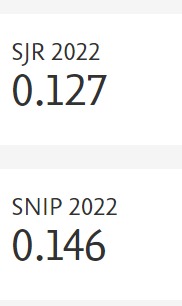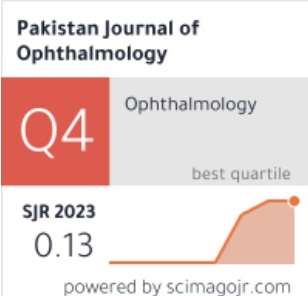Real-World Indications for Intravitreal Anti-VEGF Injections in Tertiary Eye Care Hospitals: A Multi-Center Study
Doi: 10.36351/pjo.v41i3.1994
DOI:
https://doi.org/10.36351/pjo.v41i3.1994Abstract
Purpose: To evaluate the spectrum of ocular conditions requiring intravitreal anti-VEGF therapy in a hospital-based setting.
Study Design: Retrospective study.
Place and Duration: Places of study were Akhtar Saeed Medical and dental college, Lahore and Lahore Medicare Eyecenter from July 2023 to December 2023.
Methods: Medical records of patients who had intravitreal anti-VEGF injections were retrieved.Patients less than 50 years of age, patients who had retinopathy of prematurity, known case of cancer or malignant disease and any other ocular disease were excluded.Name, gender, type and indication for intravitreal injection were noted for each patient.
Results: Out of 547 patients 53.2% were females. One eye of each patient was included in the study. The most used anti VEGF was Aflibercept (46.4%), followed by Ranibizumab (30.9%) and Bevacizumab (22.7%). No major difference was observed among gender distribution regarding threeanti VEGF used. The most common indication was diabetic macular edema 146 (26.69%) eyes, followed by wet Age-related macular degeneration, 118 (21.40%) eyes and vitreous hemorrhage due to retinal vascular diseases, 118 (21.60%) eyes. Other indications were proliferative diabetic retinopathy (19.74%), Central retinal vein occlusion (5.48%) and branch retinal vein occlusion (1.28%). Three minor indications were central serous chorioretinopathy (1.09%), macular telangiectasia (0.36%) and posterior uveitis (0.36%).
Conclusion: Intravitreal anti-VEGF therapy was most indicated for diabetic macular edema, wet age-related macular degeneration, and retinal vascular complications, with Aflibercept being the most frequently used agent in this hospital-based cohort.
Keyword: Anti-Vascular Endothelial Growth Factor, Bevacizumab, Aflibercept, Ranibizumab, Choroidal Neovascularization, Age Related Macular Degeneration.

Downloads
Published
How to Cite
Issue
Section
License
Copyright (c) 2025 Sidrah Riaz, Dr Muhammad Khan, 3. Dr. Qasim Lateef Chaudhry , 4. Dr. Sofia Lateef Chaudhry , 5. Dr. Faraz Munir

This work is licensed under a Creative Commons Attribution-NonCommercial 4.0 International License.






